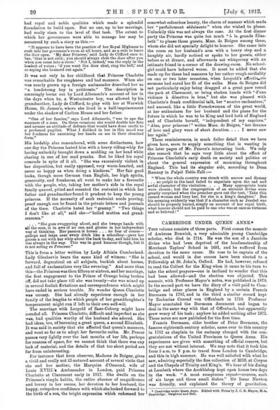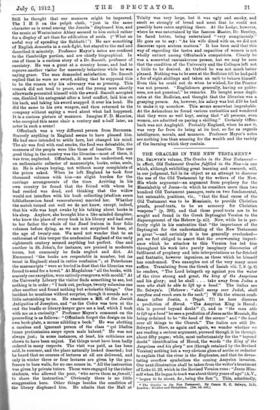CAMBRIDGE UNDER QUEEN ANNE.*
THIS volume consists of three parte. First comes the memoir of Ambrose Bonwick, a very admirable young Cambridge scholar, who died in 1714. He was the son of a Jacobite divine who had been deprived of the headmastership of Merchant Taylors' School in 1691, and he suffered from devotion to the same cause. He rose to be captain of the school, and would in due course have been elected to a Fellowship at St. John's, Oxford. He had, however, refused to read the Collect for the King when it came to bis turn to take the school prayers—one is inclined to wonder that this had been allowed—and the election was objected. This memoir, with Professor Mayor's notes, was published in 1870. In the second part we have the diary of a visit paid to Cam- bridge and other places in England by a certain Francis Burmann in 1702, and in the third a similar record kept by Zacharias Conrad von Offenbach in 1710. Professor Mayor annotated the Burmann document and began to deal in the same way with that of Offenbach, but apparently grew weary of his task ; anyhow he added nothing after 1871. These notes are now published for the first time.
Francis Burmann, elder brother of Peter Burmann, the famous eighteenth-century scholar, came over to this country in 1702 as chaplain to the embassy charged with the con- gratulations of the United Provinces to Queen Anne. His experiences are given with something of official reserve, but they are not without interest. We may note that it took him from 5 a.m. to 8 p.m. to travel from London to Cambridge, and this in high summer. He was well satisfied with what he saw, admiring especially the fine collection of MSS. at Corpus and the Chapels of Trinity and King's. We hear of his dining at Lambeth where the Archbishop kept open house two days in the week. " A most sumptuous repast—courses, each of six large and three small dishes." Sir Isaac Newton was friendly, and explained the theory of gravitation.
• Cambridge under Queen Anne. Edited with Notes by J. C. B. Mayor, M.A. Cambridge : Daiglaton and Bell. •
still be thought that our manners might be improved. The I H S on the pulpit cloth, "just in the same character as is usual among the Jesuits" displeased him, and the music at Westminster Abbey seemed to him suited rather for a display of art than for edification of souls. (- What an awful way of spending the Sabbath ! ") He saw something of English dementia in a cock-fight, but stayed to the end and described it minutely. Professor Mayor's notes are confined to the Cambridge portion, and are chiefly biographical. In one of them is a curious story of a Dr. Swoult, professor of casuistry. He was a guest at a country house, and had to reprove another visitor for unseemly behaviour while he was saying grace. The man demanded satisfaction. Dr. Smoult replied that he wore no sword, adding that he supposed this to be the reason why his adversary was so pressing. This remark did not tend to peace, and the young man shortly afterwards presented himself with the sword. Smoult accepted one, disabled his antagonist after a brief conflict, laid him on his back, and taking his sword snapped it over his head. He did the same to his own weapon, and then returned to the company without saying a word about what had happened. It is a curious picture of manners. Imagine F. D. Maurice, who occupied this same chair a century and a-half later, an actor in such a scene!
Offenbach was a very different person from Burmann. Scarcely anything in England seems to have pleased him. He had once intended to settle here, but changed his mind. The air was foul with coal smoke, the food was detestable, the manners of the people were like those of lunatics. The one good thing in the country was the libraries—most of them, it was true, neglected. Offenbach, it must be understood, was an enthusiastic collector of manuscripts, books, coins, seals, &c. He is always buying, not without many complaints of the prices asked. When he left England he took four thousand volumes with him—no slight burden for the carriage arrangements of the time. Arriving in his own country he found that the friend with whom he had resided was dead, and thinking that the widow would not interfere with his book collecting (studium suum bibliothecarium hand remoraturam) married her. Whether the match turned out well we do not know, except, indeed, that his wife was kept awake by his talking about books in his sleep. Anyhow, she brought him a like-minded daughter, who knew the place of every book in hie library and had read to her father the whole of the Basel lexicon in four folio volumes before dying, as we are not surprised to hear, at the age of twenty-one. We need not wonder that to an enthusiast of this temper the academical England of the early eighteenth century seemed anything but perfect. One and another in St. John's, for instance, are praised in moderate terms, but commonly he finds neglect and dirt. At Emmanuel " the books are respectable in number, but (as usual in England) stand in entire confusion "; at Peterhouse the manuscripts " were so buried in dust that the librarian was forced to send for a towel." At Magdalene " all the books, with scarcely one exception, were entirely overgrown with mould." At the University Library the visitor finds something to see, but nothing is in order : " I took out, perhaps, twenty volumina one after another and found nothing but scholastic things." One incident he mentions without surprise, though it sounds not a little astonishing to us. He examines a MS. of the Jewish Antiquities of Josephus, and "as the Codes was torn at the end the beadle or library-keeper gave me a leaf, which I took with me as a curiosity." Professor Mayor's comment on the proceeding is as follows " Offenbach forgot the design on his own book-plate, a mouse nibbling a book." He was abetting a careless and ignorant person of the class " qui libellee immo pretiosissima saepe opera male habent." He was not always just ; in some instances, at least, his criticisms are shown to have been unjust. Yet things must have been badly ordered in many respects. The visit was paid, as has been said, in summer, and the place naturally looked deserted ; but be beard that no courses of lectures at all are delivered, and only in winter three or four lectures are given by the pro- fessors to hare walls, for no one comes in. "All the instruction was given by private tutors. These were engaged by the richer students, who allowed the poor, who serve them as famuli,' to share the instruction." Obviously there is no little exaggeration here. Other things besides the condition of the library displeased him. He admits that the Hall at Trinity was very large, but it was ugly and smoky, and smelt so strongly of bread and meat that he could not possibly have eaten anything there. At the Lodge, however, where he was entertained by the famous Master, Dr. Bentley, he fared better, being entertained " very sumptuously." He goes on to say: "As his wife dined with us, we did not discourse upon serious matters." It has been said that this way of regarding the tastes and capacities of women is not wholly extinct among Offenbach's compatriots. Clearly he was a somewhat cantankerous person, but we may be sure that the condition of the University and the Colleges left not a little to be desired. At Oxford he was not much better pleased. Nothing was to be seen at the Bodleian till he had paid a fee of eight shillings and taken an oath to behave himself. Even this he could not do when he wished, for the Proctor was not present. "Englishmen generally, having no polite. ness, are not punetual," he remarks. He bought some dupli- cates at the Bodleian, and thought that the librarian was a grasping person. As, however, his salary was but £10 be bad to make it up somehow. This seems somewhat improbable. At the Ashmolean he found various curiosities and wondered that they were so well kept, seeing that " all persons, even women, are admitted on paying a shilling." Certainly Offen- bach was not Anglophil. Probably England, when be saw it, was very far from its being at its best, so far as regards intelligence, morals, and manners. Professor Mayor's notes are nothing less than amazing for the wealth and the variety of the learning which they contain.



















































 Previous page
Previous page